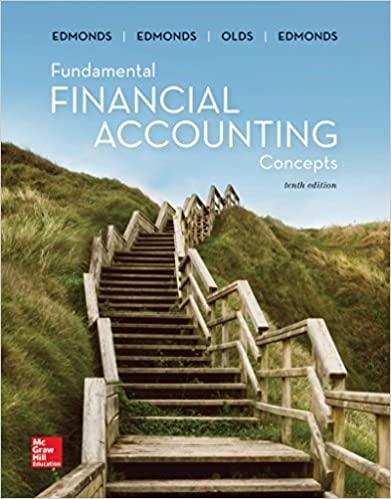Question
1. An aging of a company's accounts receivable indicates that $11,000 is estimated to be uncollectible. If the Allowance for Doubtful Accounts has a $1,600
1. An aging of a company's accounts receivable indicates that $11,000 is estimated to be uncollectible. If the Allowance for Doubtful Accounts has a $1,600 debit balance (before adjustment), the adjusting entry to record bad debts expense for the period will require a:
(a) Debit to Bad Debts Expense for $12,600
(b) Debit to Bad Debts Expense for $11,000
(c) Debit to Bad Debts Expense for $9,400
(d) Credit to Allowance for Doubtful Accounts for $11,000
2. The carrying amount (i.e. NRV) of Accounts Receivable is $19,000 before the write off of a $2,500 uncollectible accounts receivable. What is the carrying amount after the write off?
(a) $21,500
(b) $19,000
(c) $16,500
(d) Some other amount
3. Norwood Corp. receives a $7,000, 6-month, 4% note from Zest Corp. in settlement of a past-due accounts receivable. What entry will Norwood Corp. make upon receiving the note?
(a) Notes Receivable.......................................................... 7,140
Accounts Receivable............................................. 7,140
(b) Notes Receivable.......................................................... 7,140
Accounts Receivable............................................. 7,000
Interest Revenue ................................................... 140
(c) Notes Receivable.......................................................... 7,000
Accounts Receivable............................................. 7,000
(d) Notes Receivable.......................................................... 7,000
Interest Receivable....................................................... 140
Accounts Receivable............................................. 7,000
Interest Revenue.................................................... 140
4. A customer makes a sales return (which included HST) to a retailer. The retailer will record the sales return by debiting:
a) HST Expense.
b) HST Payable.
c) HST Recoverable.
d) No entry debiting HST is needed.
5. Which of the following is included in the cost of constructing a building?
(a) cost of paving a parking lot
(b) cost of grading the land on which the building is to be constructed
(c) interest costs on a building loan incurred during construction
(d) cost of removing a demolished old building that existed on the land when it was purchased
6. Quinto Ltd. purchased factory equipment for $200,000, and estimated that the equipment will have a $20,000 residual value at the end of its estimated 5-year useful life. Ifuses the double diminishing-balance method of depreciation, the depreciation expense for the second year after purchase would be:
(a) $43,200.
(b) $48,000.
(c) $72,000.
(d) $80,000.
7. In the recording of goodwill in the acquisition cost of an entire business:
(a) goodwill is recorded as the excess of the acquisition cost over the fair value of the identifiable net assets.
(b) goodwill is recorded only under ASPE (not under IFRS)
(c) goodwill, if it exists, is never recorded.
(d) goodwill is recorded as the excess of the acquisition cost over the carrying amount (book value) of the identifiable net assets
8. The entry to record interest expense on a note payable is a:
(a) debit to interest expense and credit to note payable.
(b) debit to note payable and credit to interest revenue.
(c) debit to interest payable and credit to interest revenue.
(d) debit to interest expense and credit to interest payable.
9. The following totals for the month of April were taken from the payroll register of Liu Corp.:
Gross salaries........................................ $26,850
CPP withheld.............................................. 1,330
Employee income taxes withheld............... 5,785
Medical insurance deductions....................... 930
EI withheld..................................................... 478
Union dues withheld...................................... 446
The journal entry to record the accrual of the employee's portion of Canada Pension Plan (CPP) would include a:
(a) debit to CPP Payable of $1,330.
(b) debit to CPP Expense of $1,330.
(c) credit to Employee Benefits Expense of $1,330.
(d) credit to CPP Payable of $1,330.
10. Under IFRS, if a company can determine a reasonable estimate of an expected loss from a lawsuit and it is probable it will lose the lawsuit, it should:
(a) disclose the basic facts regarding the lawsuit in the notes to its financial statements.
(b) record the loss.
(c) neither disclose in the notes nor record the loss.
(d) pay the amount estimated.
Step by Step Solution
There are 3 Steps involved in it
Step: 1

Get Instant Access to Expert-Tailored Solutions
See step-by-step solutions with expert insights and AI powered tools for academic success
Step: 2

Step: 3

Ace Your Homework with AI
Get the answers you need in no time with our AI-driven, step-by-step assistance
Get Started


